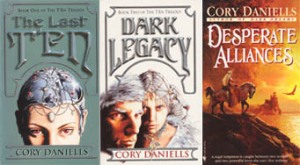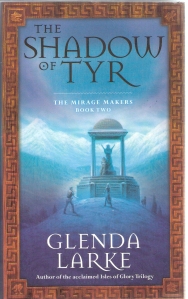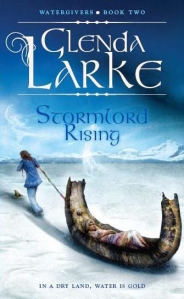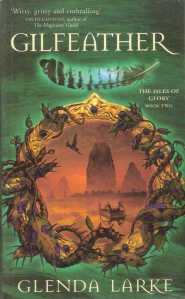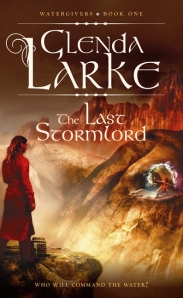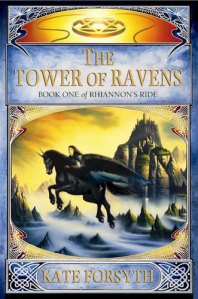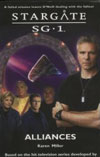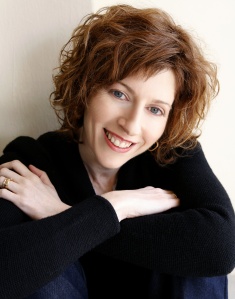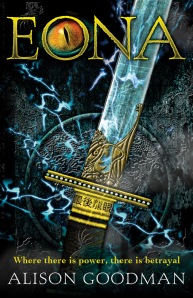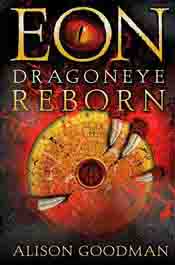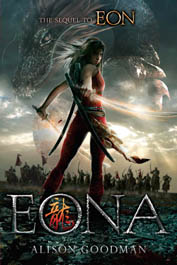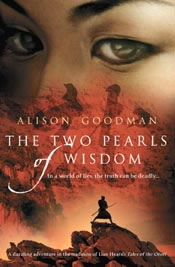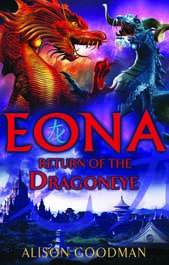As the next of my series featuring fantastic female fantasy authors (see disclaimer) I’ve invited the prolific and cross-genre author, the talented Kate Elliott to drop by.
Watch out for the give-away question at the end of the interview.
 Q: We met at World Con in Melbourne in 2010. This was only the fourth time a World Con has been to Australia since 1975. As you are based in Hawaii do you miss out on a lot of conventions, or do you make the effort to get to them?
Q: We met at World Con in Melbourne in 2010. This was only the fourth time a World Con has been to Australia since 1975. As you are based in Hawaii do you miss out on a lot of conventions, or do you make the effort to get to them?
Since moving to Hawaii in 2002, I do not have the opportunity to attend many conventions. The closest is a 5 + hour flight, and flights to and from Hawaii are not cheap. So these days I am likely to attend only one convention a year, if that. Conventionally speaking, my isolation in the middle of the Pacific Ocean has worked in my favor in one way, however: Going to Australia was relatively “close” so I jumped at the chance to attend AussieCon in Melbourne and am glad I did.
 Q: I have to ask this question. You had four books published under Alis A Rasmussen – The Labyrinth Gate, a ‘through the tarot cards to another world’ fantasy and the Highroad Trilogy, which looks like a fun space opera. Why did you change to the Kate Elliot name?
Q: I have to ask this question. You had four books published under Alis A Rasmussen – The Labyrinth Gate, a ‘through the tarot cards to another world’ fantasy and the Highroad Trilogy, which looks like a fun space opera. Why did you change to the Kate Elliot name?
I was asked to take a pen name to launch a new series (Jaran 1992) with a new publisher. Three years later, Robin Hobb was born when Megan Lindholm was asked to do the same thing. Launching a new series and what publishers often call a “new brand” is now relatively commonplace, although readers aren’t necessarily aware of it. It’s a way to create a new identity in a different genre, or to get out from under a series that did not sell well and try to make a bigger splash with a new series. This worked well 15 years ago before the explosion of social media. Now I think it is much more difficult to pull off a new public writing identity.
Q: I see you have a page dedicated to The Writing Life on your web site, with lots of useful information for aspiring writers. Do you run workshops and get involved with developing writers?
 I recall clearly the long lonely road I took in my early years of writing. I think many aspiring writers don’t have access to writing groups or workshops because there aren’t any writing groups near by, they may not be able to afford the time or money to attend a workshop, or they simply don’t know how to connect up with such groups. I write my articles on writing for those people, who may be working in what feels to them like isolation. I want them to know there are many writers out here, and we all face many of the same problems.
I recall clearly the long lonely road I took in my early years of writing. I think many aspiring writers don’t have access to writing groups or workshops because there aren’t any writing groups near by, they may not be able to afford the time or money to attend a workshop, or they simply don’t know how to connect up with such groups. I write my articles on writing for those people, who may be working in what feels to them like isolation. I want them to know there are many writers out here, and we all face many of the same problems.
I’ve never run a workshop myself. I don’t really have the personality to be a teacher, as I find it very exhausting. While I have personally helped a few developing writers, these days I don’t do so except in rare cases because I simply do not have time.
Q: Your first series was Novels of Jaran, and it was SF, but somehow the book made it onto Locus’s Recommended List for SF, Fantasy and Horror. How did this come about?
I’m not sure! The first book is set almost exclusively on an interdicted planet with low technology cultures, and the heroine and the people she is traveling with ride horses, so perhaps there was a sense that it “felt like” a fantasy novel even though it is clearly science fiction.
 Q: There are four books in the series. I like your description of the series: ‘It’s about people, mostly, and about the historical process: what happens when two cultures come into contact — and conflict. It’s about consequences.’ I see the protagonist in the fourth book, The Law of Becoming, was 16. Is the series YA?
Q: There are four books in the series. I like your description of the series: ‘It’s about people, mostly, and about the historical process: what happens when two cultures come into contact — and conflict. It’s about consequences.’ I see the protagonist in the fourth book, The Law of Becoming, was 16. Is the series YA?
Jaran is not a YA series, although teenagers can certainly read it and many have. In fact, my current editor at Orbit Books, Devi Pillai, read Jaran when she was 13.
The protagonist of Jaran (the first novel) is 22 and has just graduated from university. The subsequent books add additional protagonists, some of whom are younger and some older, but certainly the character of Ilyana in book 4 is the youngest of all the point of view characters in the series as a whole.
 Q: In 1996 you co-wrote The Golden Key with Melanie Rawn and Jennifer Roberson. The book was a World Fantasy Finalist. Can you tell us a little about the collaboration process? I always find this fascinating.
Q: In 1996 you co-wrote The Golden Key with Melanie Rawn and Jennifer Roberson. The book was a World Fantasy Finalist. Can you tell us a little about the collaboration process? I always find this fascinating.
After we agreed to collaborate, the two most important issues were how we would handle 1) the world-building and 2) the actual blending of writing.
We met for a long weekend for an initial world-building sessions in which we hammered out the main elements of the world, culture, main characters, and plot. It was a really fabulous three days. What I remember most is that we came up with things out of the synergy of the three of us bouncing ideas off each other in a way we couldn’t have done if we had each been working separately and alone. It was a great experience.
For the other, we decided not to try to write a braided novel with three points of view moving in and out of the tale. Instead we deliberately went for a generational saga, so that we would each write one generation’s story. That way we used all the same world building and the overarching plot we had come up with together, but we each wrote a separate “novella” (actually, a short novel in length each) that was complete in itself. That way we avoided trampling on each other’s toes during the writing process.
I’m very proud of The Golden Key. It was truly a collaboration: It is the book it is because the three of us, working together, came up with something bigger than any one of us would have managed alone.
 Q: With The Crown of Stars, book one: King’s Dragon was a Nebula Finalist. This series is set in an alternate Europe. Did you let your inner history buff out to play?
Q: With The Crown of Stars, book one: King’s Dragon was a Nebula Finalist. This series is set in an alternate Europe. Did you let your inner history buff out to play?
I did a lot of research. I’m not sure I’m a history buff as much as I was very aware of how much scholars know about the medieval period and how little I do. I didn’t want to screw up too much so I worked hard at making sure as much of the bigger picture as well as the details had a degree of authenticity even though the books are not set in our medieval Europe. Certainly, however, almost everything in the books is directly borrowed from history and from scholarship I read that illuminated that history for me. Translations into English of works from that time were invaluable as I tried to get a handle on ways people would look at the world differently than we do. I think that is at the heart of writing good fantasy: That the people in your books live the way they live in their world, not the way you live in your world.
Q: This is a seven book series. While you were writing it, did you have a flow chart that showed who was related to who and where they were over the years that the books cover? How do you keep it all straight?
There is a lot I simply kept in my head. However, I did create a calendar on which I wrote events on the day and month and year they happened. It spans the same timeline as the story, which takes place over seven years. I also made an index of character names and their associations, because there were so many characters that if I needed to know the name of the attendant of one of the nobles, say, it was far less time consuming if I had a place I could look it up than if I had to flip through the books looking for a reference to that character.
 Other than that, I mostly have multiple file folders of scrawled notes in no particular order except by categories, things like astronomy, architecture, and so on, and many many academic articles on various subjects in folders by topic.
Other than that, I mostly have multiple file folders of scrawled notes in no particular order except by categories, things like astronomy, architecture, and so on, and many many academic articles on various subjects in folders by topic.
I actually did a better job creating a reference notebook for the Crossroads Trilogy, with tabbed dividers with subjects like Calendar, Language, Guardians and Eagles, Geography. What I learned from my less organized work in Crown of Stars was that the better organized my reference notebook was, the easier it was to look up details when I needed them rather than relying on my memory.
Q: The Crossroads Series is described as High Fantasy. I love the covers on these in both editions. Do you get much say in the look of your covers?
No.
With the USA cover for Spirit Gate, I did specifically mention two things, however, although technically these were merely requests because in fact I don’t have any say over covers. I wrote up a description of how the reeves are harnessed to the eagles, and the artist clearly used my description rather than having the reeve riding atop the eagle as a person rides a horse. The other request was that the woman depicted as a reeve on Spirit Gate be a woman of color, not blonde or white, as there is only a single white-skinned, blonde character in the land known as the Hundred, where most of the action takes place.
Q: The Spiritwalker Trilogy. With a description like this: ‘An Afro-Celtic post-Roman icepunk Regency fantasy adventure with airships, Phoenician spies, the intelligent descendents of troodons, and a dash of steampunk whose gas lamps can be easily doused by the touch of a powerful cold mage.’ Who could resist this series? Do you find that publishers are more open to cross genre now than they used to be when you were first writing?
 I think publishers reflect the times in that sense. The entire artistic genre of mash-ups is a product of the new media and very much a part of the new century. I think that books that have a mashed-up quality therefore fit right into the new artistic sensibilities. Publishers, writers, and readers all seem more interested in cross genre and mash-ups. I don’t think they’re at all unusual any more.
I think publishers reflect the times in that sense. The entire artistic genre of mash-ups is a product of the new media and very much a part of the new century. I think that books that have a mashed-up quality therefore fit right into the new artistic sensibilities. Publishers, writers, and readers all seem more interested in cross genre and mash-ups. I don’t think they’re at all unusual any more.
Q: I was prompted to start this series of interviews because there seems to be a perception in the US and the UK that fantasy is a bit of a boy’s club. Do you think there’s a difference in the way males and females write fantasy?
In essentials? No.
I think there are differences in the way individuals write fantasy, and then in our culture those differences tend to get mapped onto a gender axis because our culture is comfortable defining and patterning things along the gender axis as if differences between genders are more important than differences between individuals.
But it might be possible to quantify some weighted differences.
As far as I know, no one has done a study of the last 30 or 40 years of the science fiction and fantasy fields in which they analyze something as simple as character presence in fantasy fiction. Do male writers mostly write about male protagonists? How about female writers? And what about the percentages of secondary characters? Do male writers disproportionately populate their worlds with male characters (including protagonists and minor characters) overall, in a way not consistent with the actual presence of people in the world? That is, rather than showing a world in which there is an approximate 50/50 split of male to female characters, do these worlds foreground and give speaking roles to far more male characters than female? And if female characters are represented, are they represented in only a few limited types of roles, and how do they function both within the society and within the story? What about female writers? Do they tend to have more female characters throughout their books? In a wider variety of roles, with more agency and importance? Or not?
 I think a lot of the idea that males and females “write fantasy differently” has more to do with emphasis. And I personally don’t believe the emphasis has much to do with an biologically quantifiable essentialist differences; even if there were some, it would be practically impossible to tease out what those were from the morass of cultural expectations and assumptions that tend to bury everything else.
I think a lot of the idea that males and females “write fantasy differently” has more to do with emphasis. And I personally don’t believe the emphasis has much to do with an biologically quantifiable essentialist differences; even if there were some, it would be practically impossible to tease out what those were from the morass of cultural expectations and assumptions that tend to bury everything else.
Because in addition to the quantifiable issue of character presence, there is also the issue of what actions, events, details, and experiences are emphasised. Emphasis and “worthiness” can be culturally influenced by unexamined assumptions about what matters enough to be written about or noticed. So in that sense, it’s a little difficult to say that men write differently than women BECAUSE of their gender rather than because of what culture tells us about gender. It’s a subtle difference, but if we’re talking about “real” potential differences in writing, I think it is the crucial one.
I think we carry exceedingly strong cultural expectations about gender and about the past, and especially about ideas about “how” the past “was” that often ignore or deem unimportant entire swathes of human existence. I think we still assume that a male point of view combined with the male gaze (seeing things from a particular set of assumptions about what is important and worthy) is the norm. So it is perfectly possible to pick up an epic fantasy novel in which almost all the characters are male, and women practically invisible, and somehow think there is nothing exceptional or even wrong about a depiction of a world in which women barely figure. To me these are flawed depictions and bad world building. They’re not “male” or “female.”
And anyway, what is “male” and “female?“ If I want to write about clothes or sewing, then am I “writing female” even though tailoring was and is a male occupation in many societies? Or are our ideas that this must be gendered-writing cultural? If I want to write two women talking to each other about something other than a man (see also The Bechdel Test for films), does that make my writing “girly?” Are male writers more likely to have only one or a handful of female characters, few of whom ever talk to each other or relate in a meaningful way? Are female writers more likely to emphasise female relationships within a story? Again, I would call this cultural, not biological.
Until we have actual data on such questions rather than anecdotal information or suppositions based on “what everyone knows” or our assumptions about how things must be or the last two books we read, I think we can’t draw any firm conclusions.
 Q: Following on from that, does the gender of the writer change your expectations when you pick up their book?
Q: Following on from that, does the gender of the writer change your expectations when you pick up their book?
Probably to the extent that I’m more cautious, when reading a male writer, because I’m less certain there will be as wide a variety of characters in the story, and I’m more likely to fear that people like me won’t be included and more surprised and pleased when they are. Because personally, as a reader, I get tired of feeling excluded in stories.
Two of the best examples of men writing women I’ve read recently have come from outside the field and were written decades ago in the 20th century: Minty Alley by C.L.R. James and God’s Bits of Wood by Ousmane Sembene. Frankly, many a fantasy writer could take a lesson in how to truly incorporate women in what could have been a solely male-centered story from Sembene’s masterpiece about a railroad strike in West Africa in the late 1940s.
Q: And here’s the fun question. If you could book a trip on a time machine, where and when would you go, and why?
Into a future with medical advances and space travel.
Give-away Question:
What is a favorite “guilty pleasure” character type, the one you know you probably shouldn’t enjoy reading about so much but really love anyway?
One of mine (I have more than one!) is the arrogant jerk who falls in love despite himself (Darcy in Pride and Prejudice is a classic example of this type).
Follow Kate on Twitter: @KateElliottSFF
Catch up with Kate’s blog.
Catch up with Kate Elliot on GoodReads.
If you are trying to keep Kate’s vast list of books straight in your mind, here’s her bibliography.



